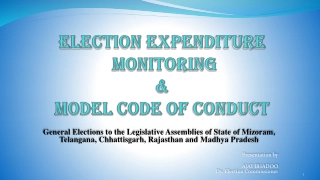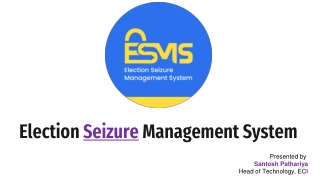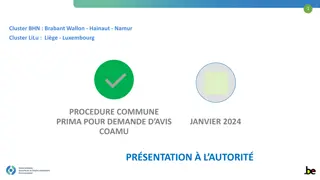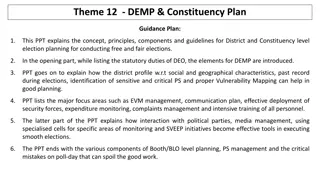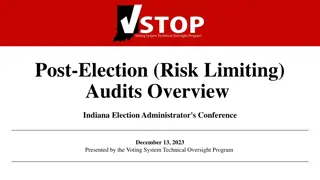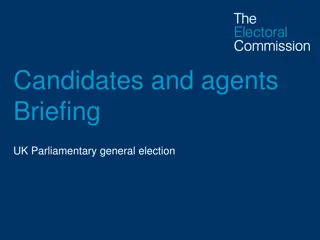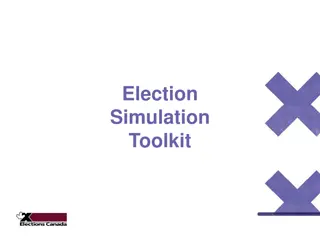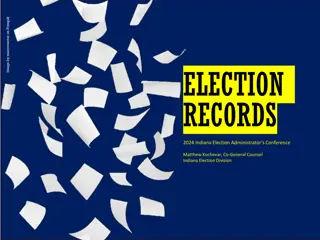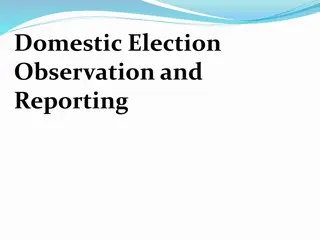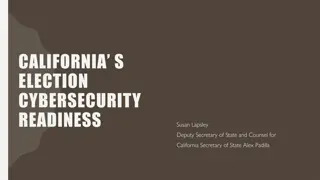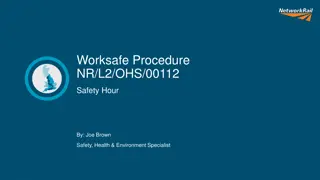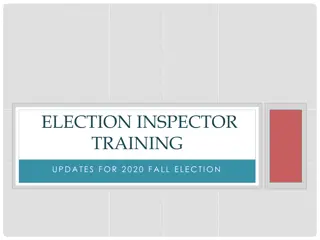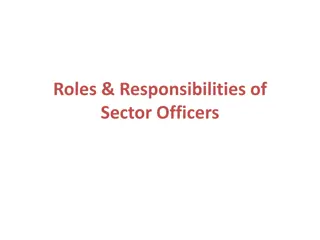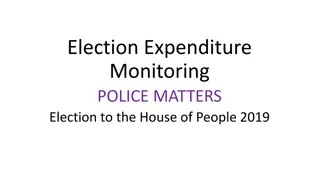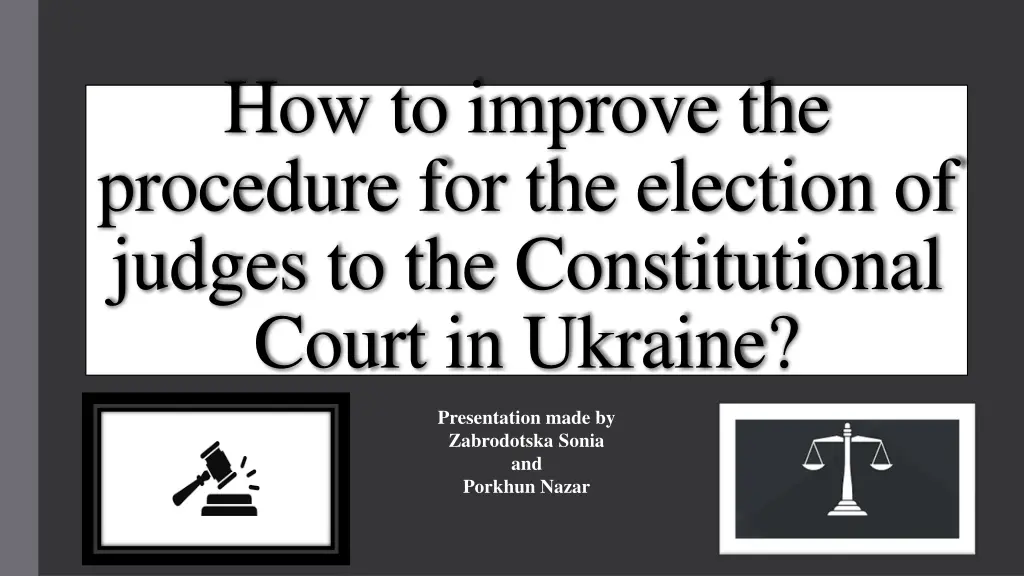
Improving Election Procedures for Constitutional Court Judges in Ukraine
Explore the process of electing Constitutional Court judges in Ukraine as presented by Zabrodotska Sonia and Porkhun Nazar. Understand the establishment, principles, regulatory documents, composition, and qualifications for judges. Discover recommendations for enhancing the election procedure for the Constitutional Court.
Download Presentation

Please find below an Image/Link to download the presentation.
The content on the website is provided AS IS for your information and personal use only. It may not be sold, licensed, or shared on other websites without obtaining consent from the author. If you encounter any issues during the download, it is possible that the publisher has removed the file from their server.
You are allowed to download the files provided on this website for personal or commercial use, subject to the condition that they are used lawfully. All files are the property of their respective owners.
The content on the website is provided AS IS for your information and personal use only. It may not be sold, licensed, or shared on other websites without obtaining consent from the author.
E N D
Presentation Transcript
How to improve the procedure for the election of judges to the Constitutional Court in Ukraine? Presentation made by Zabrodotska Sonia and Porkhun Nazar
The Constitutional Court, its establishment and commencement of operations? Today The Constitutional Court continues to play a vital role in Ukraine's legal system, ensuring the supremacy of the Constitution by deciding on the compliance of laws and providing official interpretations of the Constitution, while exercising other powers as provided by the Constitution. It adopts decisions, provides opinions, issues rulings, and temporary orders, with its first ruling issued on 13 May 1997. 1996 The current Constitution of Ukraine was adopted, defining the system of legal protection for the Fundamental Law. October 1996 The Law of Ukraine 'On the Constitutional Court of Ukraine' was passed, marking the beginning of the court's real activity.
What are the principles on which the Constitutional Court operates and what regulatory documents govern its activities? The Constitutional Court of Ukraine is the sole body of constitutional jurisdiction in Ukraine. It interprets the Constitution of Ukraine in terms of laws and other legal acts. The Court operates on the following principles: The regulatory framework of the Court's activity is enshrined in several documents: The Constitution of Ukraine (Section XII Constitutional Court of Ukraine ) Rule of law Independence The Law of Ukraine On the Constitutional Court of Ukraine of 03.07.2017 Collegiality Publicity The Rules of Procedure of the Constitutional Court of Ukraine Openness Full and comprehensive consideration of cases Validity and binding nature of decisions and conclusions
Composition of the Constitutional Court, the procedure for its formation and requirements for candidates for the positions of judges of the Constitutional Court? Appointing Judges to Ensure a Functioning Court Structure of the Constitutional Court The Constitutional Court (CCU) safeguards Ukraine's Constitution by interpreting its validity against laws and other legal acts. Grand Chamber (all judges) Two Senates (9 judges each) To function effectively, the CCU requires a minimum of 12 judges. Six Panels (3 judges each) The Court is composed of 18 judges appointed by three entities: President of Ukraine (6 judges) Verkhovna Rada of Ukraine (Parliament) (6judges) Congress of Judges of Ukraine (6 judges)
Qualifications for a CCU Judge Ukrainian citizen Proficient in the state language Age 40 or older Higher legal education At least 15 years of legal experience High moral qualities Recognized level of competence as a lawyer No political affiliation or paid work (except scientific, teaching, or creative work)
Appointment of judges of the Constitutional Court of Ukraine A judge of the Constitutional Court of Ukraine (CCU) is appointed for 9 years without the right to be reappointed.A CCU judge takes office from the day he or she takes the oath of office at a special plenary session of the CCU.The CCU President is elected for 3 years by secret ballot. 1 3 Who conducts the selection Powers of the President: A established by the President of Ukraine. 2 competition commission Approves the regulations on the competitive selection. 4 Prepares consideration: the issue for The commission: composition of the In Committee on the Legal Status of the Constitutional Court. In the Congress of Judges of Ukraine: Council of Judges of Ukraine. the Verkhovna Rada: The Lawyers with a recognised level of competence who do not participate in the competition.
Application process The positions of CCU judges under the Presidential announced on 1 March 2024. competition for the Applications were accepted until the end of the month. The documents that applicants had to submit, as well as the selection procedure requirements for candidates, were published on the official website of the President of Ukraine. quota was and Applicants 16 candidates applied for two vacancies of CCU judges under the quota of the Congress of Judges. The candidates include: Two legal scholars Nine judges A lawyer Two lawyers A prosecutor Deputy Head of the Department of the CCU Secretariat
Next steps What is the Advisory Group of Experts (AGE)? An independent body that evaluates candidates for the position of a judge of the Constitutional Court of Ukraine Consists of 6 members appointed for 3 years Works on a voluntary basis The next step for the candidates will be to check their documents on eligibility and admission to selection. the competitive Candidates' documents are available on the website of the Council of Judges of Ukraine. Who appoints the members of the AGE? The oath of office of the new judge The President of Ukraine Verkhovna Rada of Ukraine Congress of Judges of Ukraine National Academy of Legal Sciences of Ukraine Congress of representatives of law schools and research institutions Meeting of representatives of public associations On 28 May 2024, Sergiy Riznyk was sworn in as a Constitutional Court of Ukraine. judge of the The Speaker of the Verkhovna Rada of Ukraine Ruslan Stefanchuk noted that Riznyk's appointment was absolutely apolitical and based on a thorough analysis of his moral, ethical and professional qualities .
How is the competition for the position of a announced? The role of the Advisory Group of Experts in the competition How competition? to apply for the CCU judge Candidates documents within 30 days from the date announcement Documents are submitted to the competition commission, the Secretariat Verkhovna Rada of Ukraine and the Council of Judges of Ukraine submit The published on the websites of the President of Ukraine, the Verkhovna Rada of Ukraine and the Council of Judges of Ukraine Not later than 90 days before the expiration of the term of office or reaching the age limit of a CCU judge Not later than 20 days in case of a vacancy announcement is Assesses the moral qualities and level of competence of candidates Provides recommendations to the Selection Panel of the of the
Selection process: Submission of documents and passing a special check. Assessment of moral qualities by the Advisory Group. Assessment of the level of competence by the Advisory Group. Discussion of candidates by the Advisory Group. Important: The Advisory Panel has 4 months to review the documents and conduct interviews. The assessment of moral qualities and level of competence is carried out within 15 days each.
Judges of the Constitutional Court of Ukraine: the main points Written assessment: On 5 April 2024, a written assessment of 8 candidates took place. The purpose: to assess the level of competence in the field of law. The questions were developed by a group of international constitutional experts. The assessment was broadcast online. Selection of candidates: The Advisory Group of Experts compiles a list of candidates who meet the requirements based on the results of the assessment of moral qualities and competence. A rating vote is held on the candidates. The formed list is submitted to the competition commission, the Committee and the Council of Judges of Ukraine. Interview and decision: The Competition Commission, the Committee and the Council of Judges of Ukraine interview the candidates. The decision to recommend a judge is made on the basis of documents, information, assessment by theAdvisory Group and the interview. Appointment: The President of Ukraine issues a decree on the appointment based on the results of a competition. The Verkhovna Rada and the Congress of Judges also have appointment procedures.
Problematic issues in the work of the Constitutional Court of Ukraine and their impact on the effectiveness of its activities? Background: The problem of political neutrality: Since its establishment in 1996, the CCU has faced constant challenges and problems. Controversial decisions, political interference and periods of deep crisis. It has never functioned flawlessly. CCU judges must be politically neutral. They cannot belong to parties, publicly support them, or participate in politics. Appointment of judges (6 from the President, 6 from the Parliament) leads to pressure from politicians. The situation with the 2004 political reform: Influence of Presidents: The Party of Regions filed a lawsuit with the CCU to declare the reform illegal. The CCU cancelled the reform, restoring the presidential- parliamentary form of government. Yanukovych expanded his powers at the expense of the VRU and the Cabinet of Ministers. This led to the usurpation of power. Every president has sought to influence the Constitution. Yanukovych was the most unashamed.
2018: 2010: 2020-2021: Establishment of the High Anti- Corruption Court (HACC). 2010: nominee of the Party of Regions, becomes chairman Constitutional Court of Ukraine. Anatoliy Holovin, a The Oleksandr Tupytskyi, declares some anti-corruption unconstitutional. CCU, headed by of the laws 2020: 2014: June: The CCU declares the HACC law unconstitutional, dealing a blow to the fight against corruption in Ukraine. February: Revolution of Dignity. The Verkhovna Rada reintroduces the 2004 Constitution, limiting the president's powers. February: Yanukovych is ousted from office and charged in absentia with treason, usurpation of power and aiding and abetting Russia. February: Golovin is dismissed as a judge of the Constitutional Court for breach of oath.
The President of Ukraine cancels Yanukovych's decrees Tupytskyi and Kasminin as judges of the Constitutional Court. The Verkhovna Rada returns to the National Agency for the Prevention of Corruption (NAPC) the powers it had previously taken away appointing 15 December 2020 27 March 2021 20 December 2021 February 2021 The Constitutional Court of Ukraine limits the effect of the Law on Electronic Asset Declarations, weakening control over corruption among public officials. The President of Ukraine dismisses Oleksandr Tupytskyi from his post as head of the Constitutional Court. Question: And who`s to judge( ?)
Ukrainian human rights activists propose: Add a seventh member to the Advisory Group of Experts (6 members: 3 Ukrainian and 3 from the Venice Commission). This seventh member should be a Ukrainian civil society expert. Arguments in favour: Objections: Ukrainian experts have better knowledge of Ukrainian legislation. This will balance the influence of foreign experts. An odd number of members will prevent ties. European partners do not trust Ukrainian activists. There is a fear that foreign experts will have more influence. Advantages of an odd number of members: An even number of members can lead to ties and slow down the process or suspend the work of the commissions With an odd number of members, decisions can always be made. Ukraine must adapt to European standards in order to live in a state governed by the rule of law.
Understaffing: The CCU has the largest composition among European countries (18 judges), but is often understaffed. Currently, 4 seats out of 18 are vacant (3 VR quotas and 2 Congress of Judges quotas). The presence of 12 judges is required for a quorum, and 10 judges are required to pass a decision, so if there are challenges or valid reasons for not attending the CCU's meetings, the CCU may not have a quorum, which impedes the adoption of decisions by the Constitutional Court. Duration of the procedure: The appointment of a judge can take six months, which creates corruption risks. Candidates may try to "speed up" the process.
Non-transparent and bureaucratic procedure: Candidates go through numerous commissions and meetings, which can lead to unfair selection. There acquaintances or bribes. is a risk of "selection" based on personal Low public trust and awareness: Citizens do not trust the judicial system, including the procedure for appointing CCU judges. Most people are not aware of the details of the procedure and its importance.
And how can we improve the procedure, resolve all the problems? Key points on political influence: Stricter requirements for the selection of Constitutional Court judges: Introduction of stricter legislation on the procedure for selecting CCU judges. More complex rules for personal interviews of candidates with the Commission and the Anti-Corruption Bureau. Greater transparency: Ensuring greater public access to information on the results of vetting, interviews and testing of candidates. Reducing the influence of the President: Consider reducing the number of candidates proposed and appointed by the President of Ukraine. Strengthening the judiciary: The proposed changes are aimed at strengthening the role and independence of the judiciary, This will help to better balance the system of checks and balances in the Ukrainian political system.
Key points on overcoming corruption: Instead of creating new bodies, existing ones should be strengthened: Increase transparency: Instead of creating yet another anti-corruption body, it is important to focus on strengthening and improving existing institutions. This includes ensuring that they are adequately funded, resourced and empowered to carry out their tasks effectively. Increase public access to information on the selection process of CCU judges and the activities of anti-corruption bodies. Advisory group of experts Taking into account the recommendations of the Venice Commission to improve the selection procedure for CCU judges. This may include increasing the number of members of the Advisory Group of Experts (AGE) to seven and including one international expert.
Key points on awareness: The problem: Possible solutions: Insufficient public awareness of the CCU judicial selection process, the CCU and the judiciary in general. This issue is closely related to other problems such as political influence and corruption. Increase transparency: Publicise more information about the candidates, the competition process and the activities of the CCU. Use the media to announce the start of the competitive selection process for the position of a CCU judge Create social advertising about the work of the Constitutional Court, the procedure for selecting a candidate for the position of a judge of this court, the candidates themselves and, accordingly, the members of the commission that will consider these candidates. Improving the competition procedure: Taking into account the recommendations of the Venice Commission: Increasing the number of members of the Advisory Group of Experts (AGE) to seven and including one international expert. Compliance with European standards: Ensure that the CCU judicial selection procedure is in line with the best European practices.
THANK YOU FOR YOUR ATTENTION

